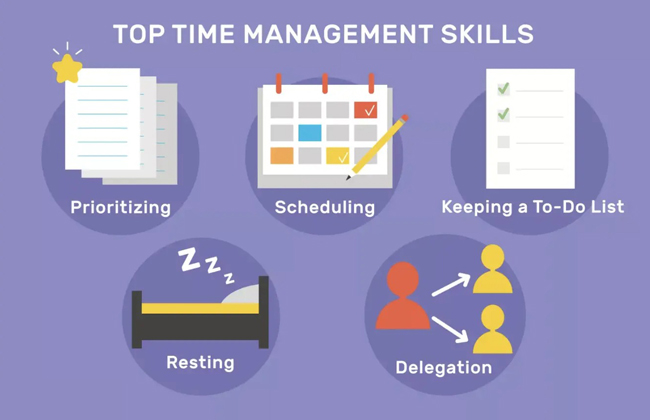- We Design Entrepreneurs.
- +92-311-567-000-1
- info@warsientrepreneurs.com
Time Management Techniques

Online Successful Entrepreneurs in Pakistan
March 8, 2024
How to Choose a Hosting Plan: Speed, Security, Scalability
March 12, 2024Time Management Techniques to Use
It is essential to have control over the work and time management techniques to achieve success. The right use of time is the key to achieving your goals. In other words, Successful people are in control of almost every single moment of their life. Successful people are in control of almost every single situation. You must remember that there is no such thing as a lack of time. There is no time, but it is taken out. Every successful person has 24 hours just like anyone else. The difference is that a successful person uses his time to achieve his important tasks and his goals an unsuccessful person does not.
A Brief History of Time Management
The roots of all time management are in business. The industrial revolution of the 19th century and the rise of factories have required a new relationship over time. Unlike agricultural labor, factory work demanded imitation. People had to learn to live by the clock instead of the sun.
Schools became more (or more) about preparing students to become good factory workers properly. Moments and productivity became more essential goals. When we think of time management, most of us think of personal time management, thus at least as clearly as managing our time to minimize it. Time management is often presented as a set of skills. The principle is that once we master it, we will be more organized, efficient, and pleasant.
Time Management Strategies, You Should Adopt
Here are seven ways to use time wisely
Day Planning
The first step is to decide what you need to do today. Then, make a list. Next, rank according to importance density. Then, For example, I make a list of my goals for the day before I go to bed, and when I go to the office in the morning, I set their timing according to their importance.
Make Work Routine Easier
It is an outstanding achievement to do your work in the shortest possible time. For example, if you can say a word or an e-mail in a few words, you don’t need to spend a lot of time on it or use a lot of words, or you can call for an action that can do with an SMS or No need to call a meeting.
Ignore The Irrelevant Activities
To make your daily use, you should always avoid irrelevant activities. For example, you gossip with your friends during work hours, paying attention to unnecessary matters.

Benefits of Time Management
1. When you learn how to manage time, you get more comfortable with work and stress less.
2. You get more extra time to enjoy yourself with your family.
3. You are way more productive than your routine.
4. Become confident in your commitments and promises.
5. Get self-esteem power.
6. More balanced and know how to leverage the work.
7. When you are doing everything well, you are mentally more relaxed.
8. Your time adherence contributes to your brand image and reputation.

Time Handling Techniques for Students
Often we are in a situation where we are in a state of waiting, for example, arriving early for an important meeting or waiting for a flight, answering a call, etc.
Save More Time
To save time further, you need to get in the habit of speeding up your work. Start work on time and try to finish ahead of schedule. Try to do the same things at the same time. Do your best not to procrastinate. Identify important deadlines, elements of routine care, and leisure and leisure time. To help you decide what you should do immediately and what can be done later, ask yourself questions such as:
Prioritize Your Activities
1. How long do I have to make this decision? Keep in touch with this person, or complete this task?
2. What you need to know to set priorities is the deadline.
You should call to get essential information and represent or get help from others. Group projects also require more time for communication and problem-solving.
Look for The Options
To achieve your preferences. Evaluate the people you think are most helpful and move on. You should never change your mind in the middle of a task unless you clarify that the change will save time. If you have doubts about this, it is best to continue in the direction you have started.
Stay Active Physical Activity
Such as swimming, running, cycling, and sports, helps relieve stress. Other beneficial activities are yoga, stretching, digging, rope jumping, or working in the garden. It is also possible to include physical activity during the workday. For example, take a walk away from the building for lunch in the park. Use the stairs instead of the elevator.

Strategies For at Workplace
Make sure you have a good time at work and have fun. A good sense of humor lets you see troubles in other contexts. Schedule your essential tasks and activities in which you prioritize doing them first. Because at the beginning of the day, you are more refreshed and full of energy. Get in the habit of doing less important work in your spare time as it is much easier to do unnecessary things. Most people do not even notice the passage of time when online. It is difficult for them to get away from the computer. So you need to schedule your internet usage or decide how many hours you want to use the internet in a week.
1. Staying connected to these accounts all the time distracts you and wastes time. Especially when you are busy with something important, it is essential to schedule your use of social media.
2. I’m too busy or don’t have time for work. There are negative phrases that make you feel helpless. I don’t think I can use my time well, and I can.

Some Tips For Time Managing For Freelancers
Independently, time is real money. With the possible exception of nutritionists who are anxious for tips, anyone who works to survive spends what they see as a close association between hours and money-making money. Therefore, freelancers need to know how to manage their time.
Create a schedule
Freelance is often a flexible schedule. Unfortunately, one of the most common mistakes new freelancers make is taking advantage of this flexibility and using it as an excuse. The best way to avoid painting yourself is to set a schedule, in the corner, on time, and stick to it.
Time Table
A freely messy little secret is that it’s a lot of time, it’s 9 to 5 jobs – 10 to 6, or 8 to 4. They’re working with your customers at whatever appropriate time. If you are not answering your call, you are more likely to pull yourself out of a gig or have passed for the next assignment that comes along.
Take Your Own Time Away
And when it comes to enjoying the rest of your life when you’re planning your time, leave nothing to chance. Spending time with yourself is not just fun and games. This work is an integral part of the balance of life. You need time to relax and recharge your batteries to be genuinely productive.
It’s OK to Have No Orders, Enjoy With Family
Lack of all work and no drama, less creativity, increased stress, and even seriousness. (Plus, it’s just no fun. You know the expression: work to work, don’t live to work.
You Are a Boss, Know Your Worth
The effect of being a super productive and reliable freelancer in a world where most people clearly do not say that customers have to trust you. What’s wrong with that? Absolutely nothing, unless you remember, that you are not an employee, and they are quite literal, not your boss.
Focus On Goals
As a freelancer, your responsibility is to help you achieve your customers’ goals. For what you say you will do, at your most significant potential. You do it for money. No matter how much you like the job or the client, don’t forget the essential fact. Your loyalty should be yourself and your business—all your other choices about which customers to take – and keep there.
Don’t Say NO
After all, the most crucial skill any working person has, whether he works for a company or himself, is the ability to draw the line by grace. Don’t be afraid to change jobs you don’t have time for, push back against extra work that doesn’t interest you, join your portfolio, or negotiate for more time or money, Whether and deserve it.
What are The Most Powerful Time Management Tools?
You must be familiar with the right tools at the right time, techniques we often use for different goals. What about the right tools for time management? If you find it interesting, answer for the means of time management below. Here’s a list of a few.
Notepad
To help you keep records and reminders, you need a notebook, notepad, or ledger to retrieve specific information at the time of need.
Calendar
Whether a student or a business person, you are always occupied with a load of work, which will make your memory a bit low. So to remember and keep things managed, you need to have a calendar to keep checking on dates and dates for particular tasks.
To-Do list
You must have a proper planner and to-do list that will help you with the time management of your tasks.
Address/Contact/Phone book
You don’t want to lose the lucky gems. Do you? To keep the people in the contacts list and fetch the related person’s number anytime. Keep an innovative address book.

What are The Basic Principles of Time Management?
So I hope you are now able to use your essential tools. But wait, ever wonder what the principle is? So here I will share a list of some time management principles.
The Pareto Principle
You are also known as the 80/20 rule, the Pareto principle, which says 80 % of your success is based upon 20% of what you perform.
The Prime Time
This means that if someone has more productive time to do tasks, other than the remaining hours. Then, you must perform the priority task at that time.
It Takes Time to Learn a New Habit
According to Tracy’s research, acquiring a new habit can take almost 21 days. So give some time to yourself and stick to the new routine unless you are habitual. This is the actual purpose of time management when you start getting time for your work, study, and family, of course.

The Basic 7 Steps of a Time Management Plan?
1. Start by writing a to-do list.
2. The second step includes removing yourself from distractions.
3. While writing down the schedule, take breaks.
4. Start breaking down the more significant tasks into smaller chunks.
5. Find out the most productive time of the day.
6. Try to be more efficient with family and work.
7. Suggestions For Daily Routine.
Suggestions For Daily Routine Time Management
Many of us are afraid of wasters who steal time.
What are Your Time Matters?
Do you need to spend a lot of time surfing the net, reading emails, posting on Facebook, texting, or making personal calls?
Create Goals
Remember, the focus is on changing your behavior. Time does not vary. An excellent place to start is to eliminate the waste of your time. For a week, for example, set a goal that you’re not taking personal phone calls or answering non-work-related text messages while you’re at work.
Extension of the Third Time Management
This goal is to change your behavior over time to achieve whatever general goal is set for you as you increase your behavior or decrease your stress. So you don’t just have to set your own specific goals but pursue them over time to see if you are meeting them.
Distribute the workload
Delegation is one of the hardest things for many business owners to learn, but you don’t have to show anyone, no matter how small your business is. We need to carry some load to other people.
Work Organization
A work organization provides an overview of the work you want to do to improve representation or outsourcing while advising the creation of terms when deciding on the time.
1. Prioritizing what is important and what’s not.
This is a crucial step in any work organization plan. It involves identifying the most critical tasks and projects and prioritizing them based on their importance and urgency. By doing this, you can ensure that you focus your time and energy on the most critical work, rather than getting bogged down in less important tasks. It can also help you avoid wasting time on tasks that are not essential to your goals.
2. Take a power nap or rest when possible.
Rest and recovery are critical for maintaining productivity and avoiding burnout. Taking a power nap or rest during the workday can help you recharge and refocus, allowing you to return to work with renewed energy and focus. Just be sure to keep your nap short (around 20-30 minutes) to avoid interfering with your sleep patterns.
3. Proper scheduling of the timetable for tasks.
Scheduling is another essential aspect of work organization. By creating a schedule for your tasks and projects, you can ensure that you have enough time to complete everything on time. It can also help you identify potential conflicts or bottlenecks in your workflow and adjust your schedule accordingly. Be sure to break down your tasks into manageable chunks and allocate enough time for each task based on its complexity and importance.
In addition to these tips, it’s also important to regularly assess and adjust your work organization plan as needed. As your priorities, workload, and goals change, you may need to adjust your schedule, re-prioritize tasks, or adopt new tools and strategies to help you stay on track. By staying flexible and adaptable, you can create a work organization plan that meets your needs and helps you achieve your goals.








